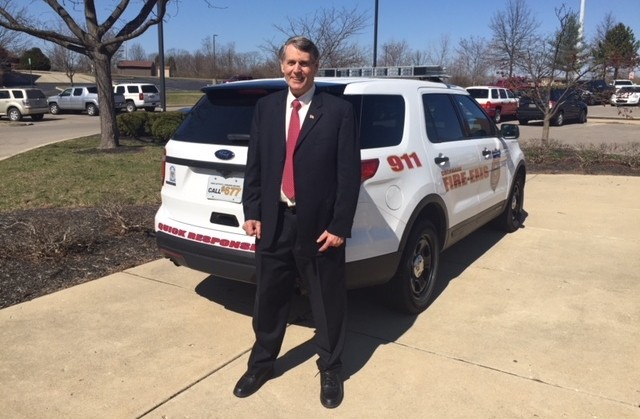
UC community paramedicine programs offer hope for opioid crisis in Ohio
Larry Bennett, chair of the fire science and emergency management program at the University of Cincinnati, personally invites the public to attend an open panel discussion and keynote address on March 12 to learn how Ohio communities can unify to address concerns like the current heroin epidemic.
Professionals and leaders from local fire, health, law enforcement and emergency medical services (EMS) organizations will discuss how community paramedicine and Quick Response Teams (QRTs) impact the local communities, and how to expand the current outreach efforts. Hamilton County Commissioner Denise Driehaus will be the keynote, speaking in support of the establishment of a county-wide QRT.
The QRT in Colerain Township visits homes of citizens recently revived by Narcan and offer them transport to a treatment facility. Community paramedicine services in Springfield Township may include follow-ups for recently discharged patients, medical support for chronic health issues, and referrals to community support programs.
Almost 85% of the nearly 250 individuals who received 'overdose follow-ups' since July 2015 have entered some type of treatment.
Colerain Township QRT Program
The QRT in Colerain Township visits homes of people recently revived by Narcan to offer them transport to a treatment facility. Community paramedicine services in Springfield Township may include follow-ups for recently discharged patients, medical support for chronic health issues, and referrals to community support programs.
These services address gaps in local primary care services, and enable EMS personnel to maintain an emergency response presence in low call-volume areas and, most importantly, save lives. Since Colerain launched their QRT over a year ago, overdoses have declined by 35 percent. Almost 85% of the nearly 250 individuals who received “Overdose Follow-ups” since July 2015 have entered some type of treatment.
Ten UC professors from multiple disciplines (fire science, social work, medicine, nursing and counseling) are collaborating to present this program, reflecting how combined effort is required to tackle large-scale community health issues like heroin overdoses and frequent 911 calls. The program demonstrates how collaborative, action-based services can combat nation-wide problems like addiction and in health care gaps.
Bennett hopes that increased public awareness and empowerment will attract attention from more lawmakers, hospitals administrators, and any other potential partners. Establishing policy and securing funding are top priorities for these critical programs to be sustainable and scalable.
Communities and individual citizens often do not know where to start in addressing epidemics and complicated issues of this magnitude, and Bennett wants to help connect the dots between problem and solution. He would love to see a county- or state-wide network for paramedicine and QRTs developed in the near future. Passion for his field drives Bennett’s pioneering spirit.
“I enjoy being an agent of change to move the industry I love, fire and EMS, to a higher level,” he said.
The full course includes two days of on-site programming on March 12 and 13, 2018, and an online component March 14-16. For the first time, UC is also offering a one-credit option for an abbreviated version of the course. Cincinnati Quick Response Team members & Violet Township Community Paramedics will be on site to provide ride-alongs so participants can get a first-hand view of these services in action.
For more information about the community paramedicine course or panel, please contact Larry Bennett in Fire Science and Emergency Management at lawrence.bennett@uc.edu.
Featured image at top: Larry Bennett stands with a Colerain Township QRT vehicle. Photo/provided.
Next Lives Here
The University of Cincinnati is classified as a Research 1 institution by the Carnegie Commission and is ranked in the National Science Foundation's Top-35 public research universities. UC's students, alumni and faculty investigate problems and innovate solutions with real-world impact. Next Lives Here.
Related Stories
Before the medals: The science behind training for freezing mountain air
February 19, 2026
From freezing temperatures to thin mountain air, University of Cincinnati exercise physiologist Christopher Kotarsky, PhD, explained how cold and altitude impact Olympic performance in a recent WLWT-TV/Ch. 5 news report.
Discovery Amplified expands research, teaching support across A&S
February 19, 2026
The College of Arts & Sciences is investing in a bold new vision for research, teaching and creative activity through Discovery Amplified. This initiative was launched through the Dean’s Office in August 2024, and is expanding its role as a central hub for scholarly activity and research support within the Arts & Sciences (A&S) community. Designed to serve faculty, students, and staff, the initiative aims to strengthen research productivity, foster collaboration, and enhance teaching innovation. Discovery Amplified was created to help scholars define and pursue academic goals while increasing the reach and impact of A&S research and training programs locally and globally. The unit provides tailored guidance, connects collaborators, and supports strategic partnerships that promote innovation across disciplines.
Blood Cancer Healing Center realizes vision of comprehensive care
February 19, 2026
With the opening of research laboratories and the UC Osher Wellness Suite and Learning Kitchen, the University of Cincinnati Cancer Center’s Blood Cancer Healing Center has brought its full mission to life as a comprehensive blood cancer hub.
